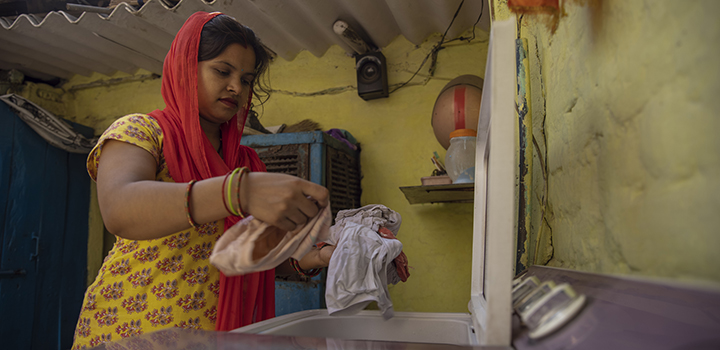Gender pay gap linked to unpaid chores in childhood
By: News archive

Young women and girls' time spent in unpaid household work contributes to the gender pay gap, according to new research from the Universities of East Anglia (UEA), Birmingham and Brunel.
The research shows women’s later employment participation is affected by taking on the weight of this care burden in childhood, thus adding to existing inequality gaps in the study countries.
The study, ‘The contribution of girls’ longer hours in unpaid work to gender gaps in early adult employment: Evidence from Ethiopia, India, Peru and Vietnam’, is published today in the journal Feminist Economics.
The research team examined data from the Young Lives project, a longitudinal cohort study of childhood poverty following the lives of 12,000 children from India, Ethiopia, Peru and Vietnam. The India sample data is from the states Andhra Pradesh and Telengana.
Following the lives of children from the age of 8 to 22, the research team analysed employment participation in any paid work and any sector (including agriculture), type of employment and wages.
According to UNICEF, girls spend 40 per cent more time on household chores than boys. Unequal shares of household care work are highly consequential for girls and linked to wider inequalities such as access to piped water, which shapes the amount of necessary work.
The amount and nature of household work influences girls’ school participation, reduces their time for study and can thus constrain their future employment opportunities.
Policy to address gender inequality in paid work needs to take into account unpaid work in childhood, said Dr Nicholas Vasilakos, of UEA. Investing in youth employment is central to development agendas and would help countries meet the UN Sustainable Development Goal of decent work for all by 2030.
Dr Vasilakos, Associate Professor of Sustainable Business Economics and Public Policy at UEA’s Norwich Business School, said: “Unequal participation in household work starts at a young age, widening differences over time suggest gendered trajectories.”
Prof Fiona Carmichael, Professor of Labour Economics at Birmingham Business School, said: “Longer hours of unpaid household work that reduces girls’ time for study may therefore limit their future lives by constraining employment opportunities.
“This confirms that the care burden to women of their greater share of household work starts back in childhood.”
At age 22, there was already a gender gap in employment participation (85.72 per cent of men versus 70.64 per cent of women). Moreover, women’s hourly wage of US$1.46/hour is significantly less (p=0.001) than men’s US$1.77/hour.
Household work is negatively related to job quality – both type of jobs and earnings – said Dr Christian Darko, a Lecturer in Applied Business and Labour Economics at the University of Birmingham.
Prof Shireen Kanji, Professor of Human Resource Management at Brunel University London, said: “It seems that in comparison to men, women’s employment is likely to be driven to a greater extent by lack of choice or by need, and is characterised by fewer opportunities for well-paid, higher-quality employment.”
However, the study did find that girls whose parents have higher aspirations for them at age 12 have better chances of higher-paid employment at age 22.
‘The contribution of girls’ longer hours in unpaid work to gender gaps in early adult employment: Evidence from Ethiopia, India, Peru and Vietnam’, is published in the journal Feminist Economics on 22 July 2022. DOI 10.1080/13545701.2022.2084559
Related Articles

Fresh evidence of ChatGPTs political bias revealed by comprehensive new study
The artificial intelligence platform ChatGPT shows a significant and systemic left-wing bias, according to a new study by the University of East Anglia (UEA).
Read more
A values crisis underpins the biodiversity and climate emergency
A new study published in Nature shows how undervaluation of nature is foundational to the environmental crisis we face.
Read more
Study reveals the increasing cost of debt caused by climate change
Climate change will increase the cost of sovereign and corporate debt worldwide according to new research led by the University of East Anglia (UEA) and the University of Cambridge.
Read more